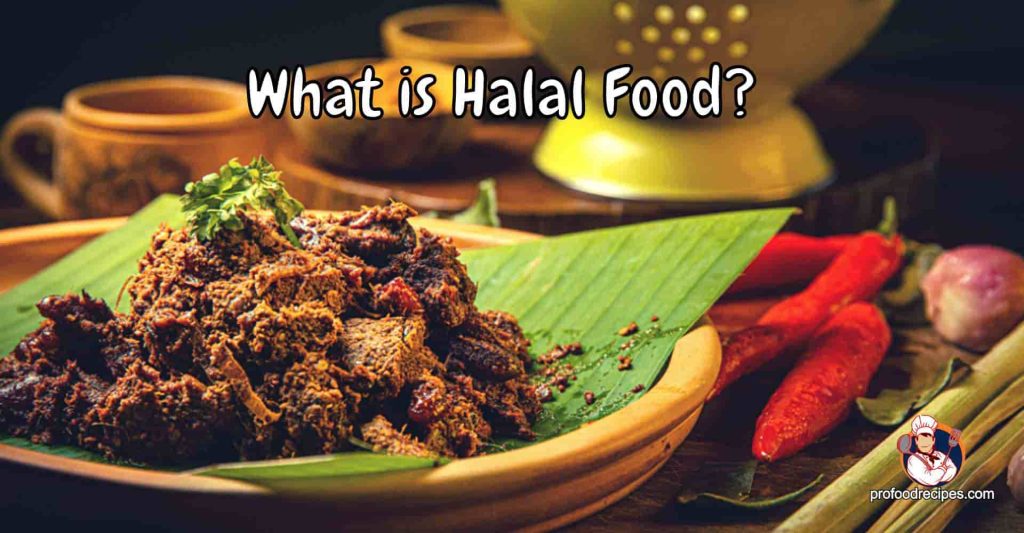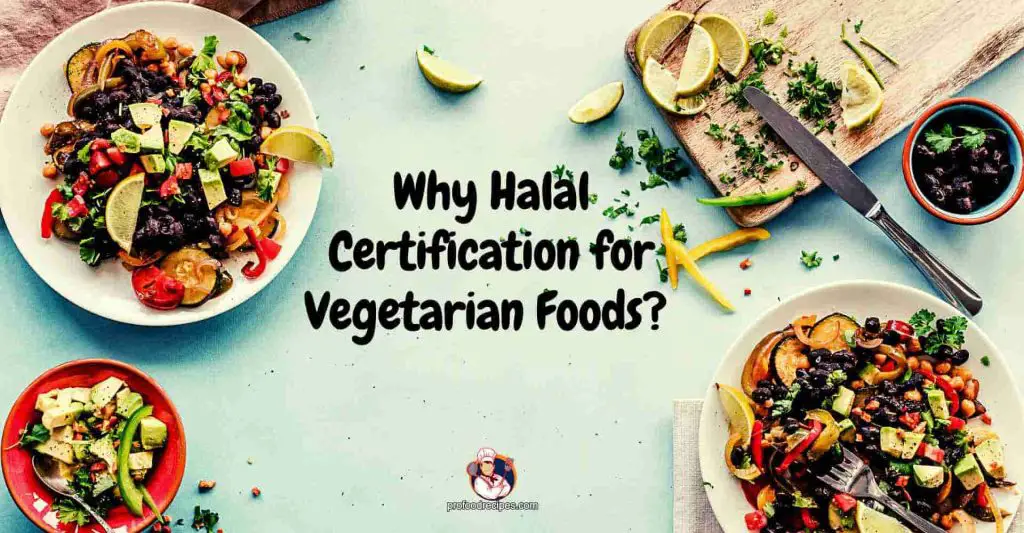Last Updated on February 11, 2023 by Amanda P. Brown
According to Islamic law, vegetarian food is halal as long as it is not exposed to haram. Any vegetarian foods prepared without the use of any haram components (such as alcohol or lard) are considered to be halal. Additionally, Islamic principles should be followed throughout the preparation process to ensure that the meal is halal for consumption.
While vegetarian dishes are generally accepted as halal, their preparation can make a difference in whether or not they actually are. You can read the following article to know further details on Is vegetarian food halal?
Is Vegetarian Food Halal?
Table of Contents
Generally, halal means permissible in Arabic, which refers to Islamic dietary regulations for Muslims inspired by the Quran and Prophet Muhammad‘s teachings (PBUH). However, when it comes to halal food, lots of halal consumers are concerned about what foods or animals can be eaten according to religious law.
Moreover, it is not easy to say whether vegetarian food is halal or haram; it depends on the criteria of the food. People primarily decide to be vegetarian due to ideological opposition to the consumption of animals or health concerns. Also, the decisions of Hindu vegetarians developed historically, and Manu Simirti, a Hindu law book, laid down the rules.
Vegetarians allow ingredients in their diet that distinguish them from halal, such as alcohol. Alcohol is typically found in sauces, dressings, and vanilla flavors. Even many vegetarians use wine as an ingredient in their recipes. But for Muslims small amount of alcohol is considered haram.
Even Hindu belief-based vegetarians forbid the consumption of many vegetables for males of specific castes, such as garlic, onions, leeks, mushrooms, etc. But these are not forbidden in Islam.
Also, India’s Gujarat government, led by the Hindu religious government, is widely promoting cow urine consumption. Hindu belief-based vegetarians encourage the use of cow urine. But it is forbidden in Halal Islamic rules. Even though most vegetarians don’t eat fish, it is permitted for Muslims. Also, some vegetarians don’t eat eggs, although it is halal for Muslims.
Additionally, which foods are halal and haram for Muslims need to be certified so that halal consumers can enjoy their food confidently. It is possible to verify that the oil or other elementary ingredients used to process or fry vegetarian food are free of alcohol-based flavors or animal fats by looking for the Halal symbol from a reputable organization such as the Islamic Services of America (ISA).
Moreover, Islamic halal food rules are not as strict as vegetarian food rules. But it has restrictions on certain haram foods.
Read More: Is Egg a Fruit or Vegetable?
What is Halal Food?

Halal food is such food that adheres to Islamic Sharia law and is generally eaten by Muslims. For example, animals or poultry slaughtering in Islamic ways may include cutting the carotid artery, jugular vein, dhabiha, and trachea.
The animals must be alive during slaughter, and all the blood drains from dead bodies. Generally, Halal food will not contain any trace of alcohol or pork and cannot be mixed with Haram products.
However, some kinds of halal foods include vegetables, fruits, chicken, fish, lamb, beef, duck, and eggs, which are typically labeled in supermarkets because it is ready and managed in a certain way. On the other hand, other foods like vegetables and fruits do not require labeling. However, certain foods are generally understood by Islamic scholars, which are permissible or haram.
Requirement for Halal Food
Generally, Halal food is the type of food that is acceptable to Muslims. So for a food to be halal, it must have specific requirements. Let’s take a look at the three conditions of real Halal food below:
- Purity
- Cleanliness
- Safe
Purity
Prepared food needs to be kept free of contaminants. This requirement is also described in Islamic laws. So, this requirement must be followed regarding Halal food for a Muslim.
Cleanliness
Cleanliness is a part of faith. So, when it comes to halal food, the food preparation area, ingredients, utensils, etc., need to be kept clean.
Safe
Prepared food needs to be safe for people to eat. So any food that can harm humans needs to be avoided, and ensure that prepared food is safe.
Potentially Haram Vegetarian Foods

Vegetarian food that does not comply with Islamic law includes the following:
1. Vanilla Extract
Vanilla is typically used in beverages and desserts; it is available in different forms (powder, essence, extract, etc.). Also, in vanilla extract, ethyl alcohol is usually present at 0.1% or fewer amounts, and this amount is less likely to cause intoxication.
There are also divided points of view about the permissibility of taking the vanilla extract. Some Muslim scholars contend that alcoholic vanilla extract is haram and they need to be avoided. On the other hand, according to other halal certifiers and scholars, vanilla extract is considered halal until the alcohol used in the manufacturing process isn’t made from dates or grapes.
Moreover, IFANCA’s doctrine regarding vanilla extract and products like being approved, oleoresin, vanilla extract, ethyl vanillin, vanillin, flavor, and powder are food elements, not food products. They’re never consumed in their pure form.
2. Alcoholic Beverages
Alcohol is considered a vegetarian-friendly product- except when made with cream and honey. Although it isn’t halal, some vegetarian foods are prepared with alcoholic beverages such as – cookies, cakes, desserts, risotto, sweets, and sushi.
Also, whiskey, red wine, rum, sake, beer, and other alcoholic drinks come in many flavors and names. It is even used as a flavor enhancer in vegetarian food. Such as:
- Onion Soup: occasionally made with-red wine.
- Desserts (Sticky Toffee Pudding, Tiramisu, Fruit Cake, and Black Forest) may have liquor and rum.
- Mushroom Risotto: occasionally made with-white wine.
Soy Sauce
Through the fermentation process, soy sauce contains a small amount of alcohol (around 2%). Also, there are different opinions regarding whether soy sauce is halal or haram. For some strict Muslims, it is haram, no matter how little the quantity of soy sauce.
On the other hand, Darul Iftaa Birmingham and some other researchers agree that the consumption of soy sauce is halal. However, soy sauce contains alcohol left over from the fermentation layer. But it will not cause intoxication and is in no way analogous to wine.
Why Halal Certification for Vegetarian Foods?

According to Islamic law and the Qur’an, Halal generally refers to food that is allowed or permissible for Muslims. These Halal foods can include fruits, grains, and vegetables. They also contain ingredients that are not halal, which makes them haram. As in the case of flour, processed flour may contain ingredients that do not make it halal.
In addition, bread, vegetarian foods, cereals, or yogurts that have been processed long ago are not considered halal. Because the ingredients used in this processed food may have hidden prohibited or haram ingredients; for example, these prohibited ingredients can be color, flavor, or processing aids.
Therefore, many vegetarian food items don’t meet halal criteria. For example, yogurt, cheese, baked goods, candy, and marshmallows may contain animal enzymes and gelatin elements that are not halal. So, Halal certification is required for vegetarian food such as vegetable products, spices, etc.
Can Muslims Eat Anything Vegetarian?
Yes, Muslims can eat anything vegetarian, but it has to be halal. Although, vegetarians may not contain meat in their diet. Even if it does not meet all the halal criteria, vegetarians can consume wine or alcohol; for Muslims, alcohol is forbidden or haram. So processed vegetarian foods need to be certified halal so that Halal consumers may enjoy vegetarian food with confidence.
Read More: Best Summer Potatoes Recipes
FAQs
Can Vegetarians Eat Halal Food?
Vegetarians can eat all traditional halal foods except meat because many vegetarians do not include meat in their diet due to health problems, religious practices, etc. Vegetarians can eat halal food like fruits, vegetables, grains, etc. But they cannot eat beef, chicken, lamb meat, etc.
What Food is Naturally Halal?
Below are some naturally halal foods:
· Seafood
· Tofu
· Legumes
· Eggs
· Halal Deli Meats
· Nuts
· Peanut Butter
Final Verdict
So, Is vegetarian food halal? From the above article, I hope you have already got the answer to this question. A Muslim can eat vegetarian food, but not all, because there are some Islamic rules for a Muslim to eat Halal food. So, for a Muslim to eat real Halal food, the food needs to be Halal certified.
You May Also Like to Read:
- Is Onion a Vegetable?
- Healthy French Salad Recipes
- Best Dairy-Free Instant Pot Recipes
- Homemade Cheese and Tomato Pizza
- How to Bake Roasted Bananas?

